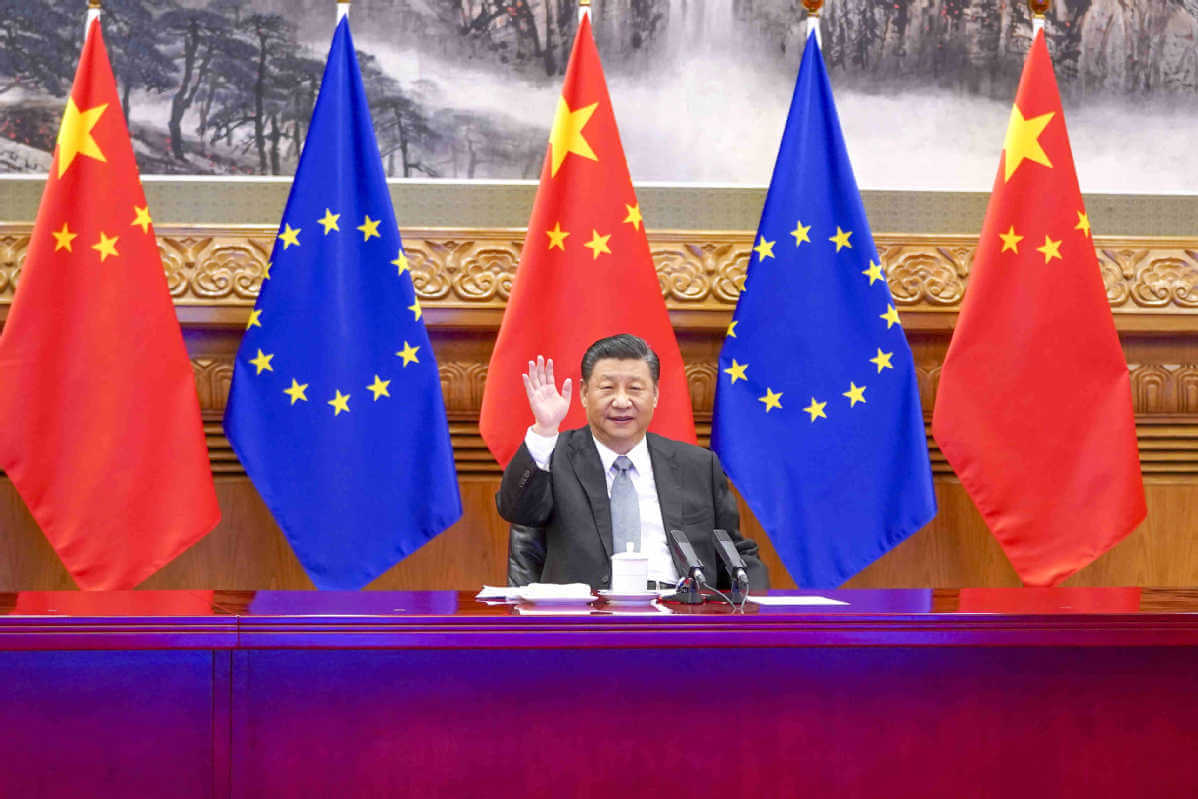The European Union (UN) on Saturday blamed China for “endangering peace and stability” in the South China Sea (SCS), referring to the hundreds of Chinese boats that have been parked at the Whitsun Reef (known as the Julian Felipe Reef in the Philippines) that lies within Manila’s 200-mile exclusive economic zone (EEZ).
“The EU is committed to secure, free and open maritime supply routes in the Indo-Pacific, in full compliance with international law, in particular, the United Nations Convention on the Law of the Sea (UNCLOS), in the interest of all,” the bloc said in a statement. It further reiterated its “strong opposition to any unilateral actions that could undermine regional stability and the international rules-based order.”
The EU’s comments came after the Philippines on Friday protested the “threatening” presence of hundreds of Chinese naval vessels in contested areas of the South China Sea. The bloc urged all parties to resolve disputes peacefully in accordance with international law, and in this regard highlighted a 2016 international arbitration that had ruled in favour of the Philippines while invalidating most of China’s territorial claims in the South China Sea. The tribunal ruled that China’s nine-dash line claim and accompanying claims to historic rights had no validity under international law and that the behaviour of Chinese ships physically obstructing Philippine vessels is unlawful.
China is engaged in several territorial disputes with multiple maritime neighbours, including Taiwan, the Philippines, Indonesia, Vietnam, Japan, South Korea, North Korea, Singapore, Brunei, Nepal, Bhutan, Laos, Mongolia, Myanmar, and Tibet. In this regard, the EU further noted said that it “supports the ASEAN-led process towards an effective, substantive, and legally binding Code of Conduct, which should not prejudice the interests of third parties.”
The EU has increasingly taken a more hardened stance against Beijing. Last week, it announced its Indo-Pacific Strategy, which reinforces the bloc’s “strategic focus, presence and actions in the Indo-Pacific” and aims to step up its influence in the region and counter China’s rising power. Additionally, a new high-level EU “progress report” also calls out Beijing for the “little progress” it has made on the economic commitments, particularly in relation to opening up digital and agricultural markets, addressing steel overcapacity, and reining in industrial subsidies. The document calls for “further, robust” measures to tackle the new challenges posed by China, whose economy is recovering from the coronavirus pandemic at a meteoric pace.
“The reality is that the EU and China have fundamental divergences, be it about their economic systems and managing globalisation, democracy, and human rights, or on how to deal with third countries. These differences are set to remain for the foreseeable future and must not be brushed under the carpet,” European Commission President Ursula von der Leyen and Josep Borrell, the EU’s foreign policy chief, said in an April 21 letter that outlined the report to the European Council.
Beijing’s relationship with the EU has also been frayed by its imposition of the national security law on Hong Kong and its treatment of Uyghur Muslims in Xinjiang. In fact, in March, the EU sanctioned four Chinese officials for orchestrating a “large-scale surveillance, detention and indoctrination programme targeting Uyghurs and people from other Muslim ethnic minorities” in the Xinjiang Uyghur Autonomous Region (XUAR).
These sanctions formed just part of a wider anti-Beijing sentiment that has been quietly brewing in the EU. In September, Germany released its new policy for the Indo-Pacific (IP), in an effort to counters Chna’s growing influence in the disputed South China Sea. Further, France has previously sent multibillion-dollar worth French Rafale fighter jets to India amidst its border tensions with China in July.
Against this backdrop, the Comprehensive Agreement on Investments (CAI), which was signed between Brussels and Beijing in December, was expected to improve China’s global trading and diplomatic position, specifically in reconciling its differences with the EU. However, current statements show that the CAI has been struggling to achieve this aim.

